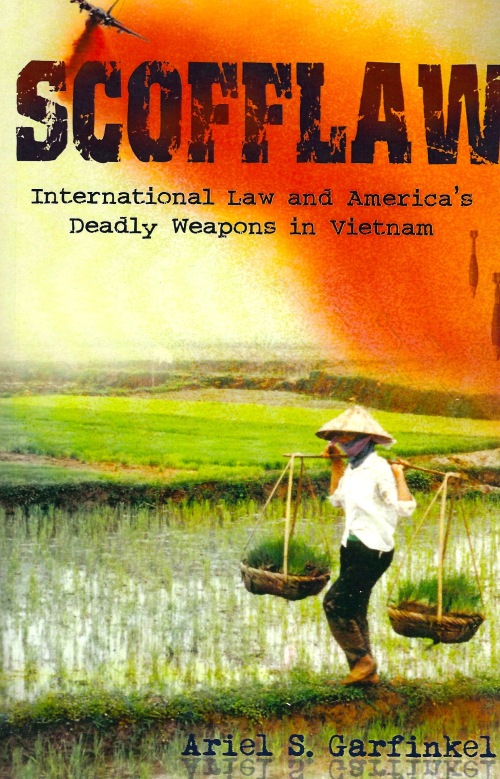Ariel S. Garfinkel, Scofflaw: International Law and America’s Deadly Weapons in Vietnam
With the recent passing of Senator John McCain, it’s clear how hard it is for many Americans see what we’ve done in the world. It’s much easier to see what others have done to us, in this case, the Vietnamese who held McCain captive and tortured him. Despite Trump’s demurrer that McCain was no “hero,” the week-long mourning and focus on his death and life speaks otherwise.
Ariel Garfinkel can help us better see who we are and who we’ve been. In her timely, informative, and piercing book, Scofflaw: International Law and America’s Deadly Weapons in Vietnam, she brings attention to the damage the U.S. did to the Vietnamese people both during the war and since, with its unexploded ordnance (UXO), and the lethal defoliant, Agent Orange. Because of these, people continue to suffer and die in excruciating ways.
Regarding UXO, Garfinkel writes, “Children are still being maimed by cluster bombs, their parents are still dying from grenades and mines, and the full removal of remaining live ordnance at the rate of success over the past two decades will reportedly take hundreds of years more.” As for Agent Orange, it is true that the U.S. government has acknowledged the significance of Agent Orange when it comes to care for our veterans, yet the government is unable and unwilling to acknowledge its responsibility for the death and devastation its has caused the Vietnamese people. According to the author, “an estimated 400,000 Vietnamese died as a result of exposure to the chemical sprays.”
The way forward, Garfinkel contends, is for the U.S. citizenry to make use of international law to push the government to act on its obligations, including making reparations to the Vietnamese people. Garfinkel has no illusions about intentional law: “The serious lack of teeth in the body and promising framework of human rights created over the past several decades cannot be denied. Even as these words are written, people suffer misery and death because states continue to undermine their obligations to human rights.”
I was reminded by Garfinkel’s analysis of the 2004 documentary, The Corporation, based on Joel Bakan’s book. Like the corporations who manufactured Agent Orange, the U.S. government cannot, or, at least up to this point, has not admitted guilt and acted on its responsibility. Whoever occupies the Oval Office will assert that the U.S. is the indispensable world leader and champion of international law. But, as Garfinkel states, by evading the laws appropriate to U.S. use of munitions and Agent Orange, the U.S. will “[remain] an international outlaw.”
Back in 2012 President Obama inaugurated an on-going commemoration of the 50th anniversary of the Vietnam War. In official activities, one can be sure that the issues Garfinkel examines will not be mentionable. It’s instinctive for us to think about how the U.S. military suffered in those years; it’s rare for us to try to imagine what the Vietnamese went through because of U.S. policy: the “mothers whose sons never returned; children whose fathers can no longer provide for the family; families with little or no economic means to feed themselves due to destroyed homes, burned fields, and missing family members; and the permanently impaired, particularly the families whose infants continue to be born with gruesome deformities due to the permanent alteration of their parents’ and grandparents’ DNA by exposure to chemical defoliants.”
Ariel Garfinkel helps us to remember. May her book persuade more U.S. citizens to act responsibly in a movement for cleaning up UXO and working for reparations for those harmed over several generations.

Prof. Chmiel, I’d appreciate the opportunity to communicate with you. I’m a retired Harvard professor, and you may reach me at scofflawbook@gmail.com. Many thanks for your consideration. Larry